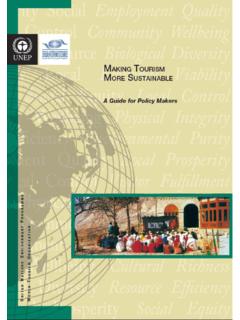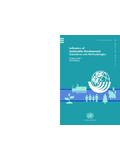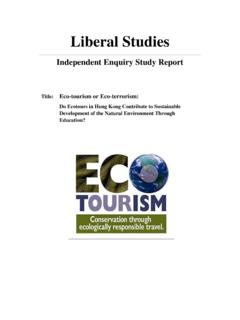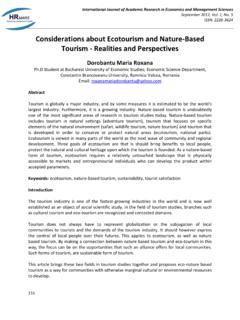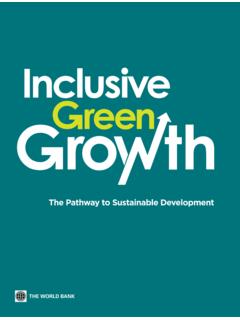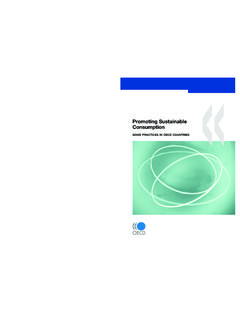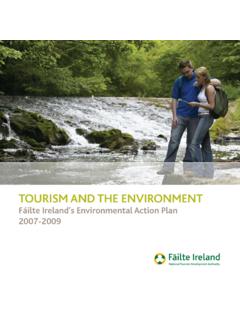Transcription of Nigeria Tourism Development Master Plan - …
1 Nigeria Tourism Development Master plan Institutional Capacity Strengthening to the Tourism Sector in Nigeria NIR/03/002. Final Report Executive Summary Government of the Federal Republic of Nigeria United Nations World Tourism Organisation United Nations Development Programme Tourism Development International January 2006. Nigeria Tourism Master plan Nigeria Tourism Master . plan . Executive Summary MESSAGE BY THE SECRETARY-GENERAL. OF THE WORLD Tourism ORGANIZATION. The rapid growth of the modern Tourism industry which, in 2005. registered approximately 800 million international tourist arrivals worldwide, has made the Tourism industry one of the most important industries of the world, particularly in economic terms. One of the most valuable characteristics of the Tourism industry is that while it has grown in numbers, it has also grown in variety of destinations as there has been a continued geographical spread of Tourism to all parts of the world which has made it possible for many countries, especially developing countries, to develop Tourism as a viable engine for socio- economic Development .
2 Essentially, Tourism can have a profound impact on the society, economy and environment of nations. Socially, one of the most immediate benefits of the Tourism industry is its ability to create employment and, in the case of Tourism , an added benefit is that it caters for both skilled and unskilled employment. As a labour-intensive industry, Tourism has the potential to create more jobs per unit of investment than any other industry and Tourism can be a useful source of employment for women and ethnic minority groups. Environmentally, Tourism , when properly developed and managed, can serve as a mechanism for protecting natural environments; preserving historical, archaeological and religious monuments; and, stimulating the practice of local cultures, folklore, traditions, arts and crafts, and cuisine. And, economically, Tourism brings many benefits to the Central Government, local authorities as well as the private sector through the generation of foreign revenue, financial returns on investment, taxation on tourists and tourist products, and, linkages to other local industries such as agriculture and fisheries.
3 One of the most important challenges facing the modern world is the fight against poverty and this is a battle that governments, agencies and institutions have been fighting over decades. We in UNWTO are convinced that with its enormous economic power and high potential for employment creation, its capacity to spread its socio-economic benefits to all levels of society and to all parts (including remote areas) of developing and least developed countries, and, its sustained resiliency in times of crisis, Tourism can be a leading sector in the fight against poverty and, it is no surprise that many governments have placed Tourism on the top of their Development agendas. Nigeria is one of the leading countries in Africa in the fight against poverty and plays an active role in UNWTO's ST-EP programme (Sustainable Tourism Eliminating Poverty) a programme which was launched in 2002 and focuses on longstanding work to encourage sustainable Tourism - social, economic and ecological - which specifically alleviates poverty, bringing Development and jobs to people living on less than a dollar a day.
4 Nigeria has chaired the Working Group of the UNWTO Executive Council (the highest policy-making organ of the Organization) which supervised the preparation of the ST-EP initiative. Furthermore, Nigeria was recently elected as the Chairman of the UNWTO Commission for Africa. UNWTO applauds the initiative of the Government of Nigeria to actively develop Tourism as a means for improving the socio-economic conditions of the Nigerian people and diversifying its economic base. However, the success of Nigeria 's Tourism industry depends on its sustainability. That is why, UNWTO, at the request of the Government of Nigeria , and through the support of the United Nations Development Programme (UNDP), executed this project for the formulation of a National Tourism Master plan for Nigeria which focuses on Institutional and Capacity Strengthening Support to the Tourism Sector.
5 The objective of this project is to promote the sustainable Development of the Tourism industry through capacity building of the Government (at the Federal level) in the areas of human resource Development , research Development , improved sectoral planning and governance. The project also provides capacity building at the local/State level in promoting Tourism Development at the community level by encouraging local community participation, ownership and management of the Tourism sector. The Master plan has addressed a number of vital issues and provides strategic recommendations in the areas of Tourism policy, governance, Development of Tourism products, marketing approach, international and domestic transportation, hospitality education and training, Tourism organization and legislation, Tourism management information systems, amongst other issues.
6 Through the implementation of this Master plan 's recommendations, it is expected that the Government of Nigeria , through its Ministry of Culture and Tourism , would be better equipped to develop and manage the Tourism industry so as to enhance the economic benefits of Tourism through sustainable, people- oriented Development policies which would spread the benefits of Tourism to all parts of the country and all layers of society, thereby greatly contributing to the eradication of poverty and the upliftment of Nigeria and its people. Francesco Frangialli Nigeria Tourism Development Master plan . EXECUTIVE SUMMARY. CONTENTS. Page Message from Secretary General of the World Tourism Organization 1. Introduction 1. 2. Master plan Report Structure 2. 3. Overview 2. 4. Key Findings 4. 5. Strategic Recommendations 10. 6. Action & Implementation Programme 16.
7 Nigeria Tourism Master plan Nigeria Tourism Master plan . EXECUTIVE SUMMARY. 1. INTRODUCTION. The Tourism Sector in the Federal Republic of Nigeria has been identified by the President of the Federal Republic, Chief Olusegun Obasanjo GCFR, as one the six priority areas for Development . A Tourism Master plan is required to develop the sector. Poverty alleviation and generation of employment, physical environmental enhancement and cultural and social issues, including HIV /Aids are central issues in the plan . The President initiated a Presidential Committee for the Nigeria Tourism Development Master plan . Subsequently, at the request of the Federal Government, the United Nations World Tourism Organisation (UNWTO) and the United Nations Development Programme (UNDP) took responsibility to part fund and implement the production of the Master plan .
8 Tourism Development International Ltd was contracted by UNWTO as the consultants to produce the plan . The project commenced in Abuja on 7th February 2005. An inception report was delivered in March 2005, a Mid Term Report on 7th August 2005 and a Draft Master plan Report on December 12th 2005. A number of consultative seminars on the findings, key conclusions and initial recommendations were held with the stakeholders during October and November, after which the Draft and Final Reports including the Master plan were produced. The Project team wish to acknowledge the evident interest of His Excellency the President of the Federal Republic in the project, the support of the Honourable Minister for Culture and Tourism , Ambassador Frank Nchita Ogbuewu, the Project Co-ordinator, Dr. Franklin Adejuwon and the officials in the Federal Ministry of Culture and Tourism , the Nigerian Tourism Development Corporation and other Federal and State Ministries as well as many government agencies.
9 The Project team thank the UNDP Resident Representative and other officers in Abuja and the UNWTO Head of the Technical Co-operation Service and officers in Madrid for the continuing support and encouragement. The support and understanding of the private sector is very much appreciated in their willingness to share information and their knowledge with the team. Finally, the many State Governors who so warmly received and assisted the team on their field visits are offered a special acknowledgement and thanks. 1. Nigeria Tourism Master plan 2. Master plan REPORT STRUCTURE. The Tourism Master plan report is divided into three volumes: Volume I CURRENT SITUATION ANALYSIS sets out the findings resulting from field visits, consultations, desk research and market research. The conclusions of the team on a range of areas, SWOT analysis and key issues for Nigeria are included.
10 Volume II STRATEGIC RECOMMENDATIONS &. IMPLEMENTATION sets out the direction and the Master plan together with the Action Programme. Volume III TECHNICAL REPORTS AND APPENDICIES supporting and elaborating the findings and recommendations of the Tourism Master plan . There is also a separately bound EXECUTIVE SUMMARY (This Document). which summarises the findings and recommendations and also includes the Action plan . 3. OVERVIEW. The principal conclusions from the analysis of the economic impact of Tourism on the economy of Nigeria conducted by the project are: Spending by international tourists has a direct impact on the national economy estimated at US$280m/N36b. Downstream economic impacts from the export revenues of international tourist spending are estimated to generate additional gross revenue of US$224m/N29b. While the incidence of domestic leisure travel may be low, the sheer size of Nigeria 's population means that there is a significant contribution to the demand for Tourism services from domestic travel activity.
